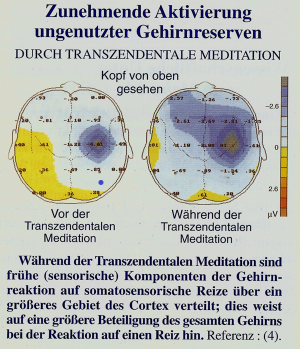Deep relaxation through Transcendental Meditation
Ayurveda and memory part 3
"A rolling stone gathers no moss" is an old saying that is often applied to memory. Many people, students and professionals alike, realize that after vacations or vacations, everyday terms don't come as easily as when you use them all the time.
Nevertheless, the experience of rest is crucial for our memory to function well. Modern research shows that both sufficient sleep and meditative deep relaxation are crucial for the brain to process the daily flood of information and store important information as a memory.
Being able to relax and experience deep rest are important prerequisites for good health.
Rudolf Steiner, the founder of anthroposophy, coined the wonderful concept of the "rhythmic structure" of the human being. His point is that it is not only the anatomical structure that constitutes the essence of the human being, but also the rhythmic sequence of rest and activity. It is clear to each of us that the body cannot function if the anatomical order is lost. We do not realize how much the loss of bio-rhythms affects our health.
Modern lifestyle
Electric light and the massive use of modern media have greatly changed the rhythm of our lives. Our pre-generations, who lived until about 150 years ago, were largely forced to go to bed early and get up early in order to use daylight for their work. Modern humans go to bed much later and sleep an average of 2 hours less than all generations before them. The departure from the sleep habits of previous generations has led to more people suffering from sleep disorders today than ever before - reportedly more than a third of the population.
Sleep before midnight
The body cannot be cheated. Regardless of when we go to sleep, between 2 a.m. and 4 a.m., hormonal glands begin to produce the neurotransmitters we need for an active day. These messengers reduce the depth of sleep. Therefore, in order for the body to regenerate sufficiently, several hours of sleep are necessary before midnight.
Fascinating studies of the brain during sleep have shown that the day's events can only be fully processed if sufficient time is available for deep sleep. Prof. Hüther, Prof. Bredesen and many others have been able to prove that constantly new interconnections of nerve fibers emanating from the brain nucleus "hippocampus" are necessary to process and store the day's flood of information.
Lack of sleep is considered by renowned researchers (Bredesen, Nehls) to be a major cause of dementia. The increase in memory disorders and associated changes in personality, as in Alzheimer's disease, are among the major threats to our society and challenges for the healthcare system.
Swimming against the tide
The new zeitgeist seems to force us to turn night into day so as not to miss important events. Don't get carried away by this! Find your own rhythm and make sure you get enough sleep before midnight.
An important tip for this: Spending long periods of time in front of screens before sleep has an unfavorable effect on sleep depth and regeneration. Make sure you spend the evening doing other activities that are more relaxing and compatible with family life than TV, computers and cell phones.
Breaks in everyday life
Bio-rhythms are varied and overlap. We need not only the day/night rhythm, but also periods of regeneration during the day and breaks at longer intervals, such as weekends and vacations.
One of the rhythms of rest and activity that every person experiences is 90 minutes. After 90 minutes, strength and attention decrease. That's why it makes sense to take short breaks from work after 90 minutes of activity. Design these breaks to be a change from your work: between phases of physical work, you should rest while sitting or lying down. Between phases of mental activity, 5 minutes of movement is the right "break."
Transcendental Meditation and Memory
Stress and information overload are more intense today than ever before. Even with good sleep and regular regeneration breaks in everyday life, we often cannot fully compensate for the stress. More and more unprocessed information disturbs the sensitive balance. Ayurveda refers to everything that we cannot fully "digest" as ama (the undigested). This "mental garbage" affects memory and emotional stability enormously. Only through particularly deep rest can these old burdens be eliminated.
Research has shown that during Transcendental Meditation, rest can be twice as deep as during deep sleep. As a result, not only a good physical regeneration takes place, but above all a release of mentally burdening stress. In this way, even deep traumas that massively limit mental and physical performance can be resolved.
Transcendental meditation is easy and suitable for everyday life
"I could not imagine how easy it is to meditate. After the instruction in TM (Transcendental Meditation), within a few days I had the confidence to meditate properly even alone at home. And although it is so simple, I felt positive effects from the very beginning: I was inwardly calmer, calmer and in a better mood, my mind is much clearer since then. Some health complaints have dissipated in a short time. The 15-20 minutes of meditation time twice a day are my best investment in health and well-being," says Mr. Albert S., who learned TM a few months ago at the House of Health.
Profound positive changes in the brain
Although Transcendental Meditation is easy to learn and practice, profound and measurable changes take place in the body during meditation. The deep relaxation leads to unique changes in brain waves, which result in higher order signs of neurons in the brain in the EEG. Such measurements have also been used to find that meditation enlivens brain regions that are otherwise silent and unused.


Memory and intelligence tests on meditators show that these changes in brain waves also have a positive effect in everyday life. Pupils as well as students and professionals experience lower stress levels and higher mental and physical performance as a result.
More information on Transcendental Meditation can be obtained from the DVD "Transcendental Meditation according to Maharishi Mahesh Yogi". The DVD contains an interview of Ayurveda doctor Dr. Ulrich Bauhofer in the broadcast "Brennpunkt München" with the topic "What can meditation do? If you are interested, you can order the DVD "Transcendental Meditation" free of charge at versand@ayurvedashop.at (while stocks last).
Summary
Good memory from school age to old age does not have to be a coincidence. Many factors can influence memory positively or negatively. If you want to be mentally fit at all times, you can't avoid taking care of your brain, which is essential in our stressful times filled with environmental toxins.
Maharishi Ayurveda offers many ways to support brain performance and memory: Herbal supplements, cleansing cures, recommendations for diet and daily routine, and last but not least, Transcendental Meditation as a top recommendation for happiness, good memory, and brain health.


We look forward to your feedback!